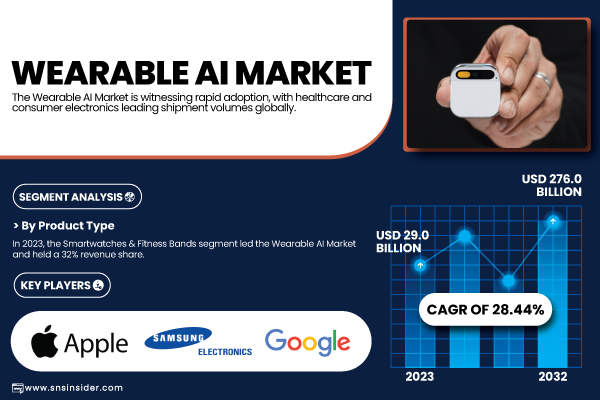Austin, June 10, 2025 (GLOBE NEWSWIRE) -- Wearable AI Market Size & Growth Insights:
According to the SNS Insider Report, “The Wearable AI Market was USD 29.0 billion in 2023 and is expected to reach USD 276.0 billion by 2032, growing at a CAGR of 28.44% over the forecast period of 2024–2032.”
AI-Powered Wearables Revolutionize Healthcare with Advanced Biometric Tracking and Early Diagnosis
Wearable AI is now experiencing a transformational growth in various sectors. This growth is reflected in healthcare and consumer electronics (AI-powered wearable), among others, where integrated wearable technologies are becoming mainstream. In fitness and health, fitness bands and smartwatches now have full-on medical-grade biometric tracking capabilities, tracking levels of heart rate, blood oxygen (SpO2), and sleeping patterns.
The U.S. The Next Generation Computing market was worth approximately USD 7.6 billion in 2023 and is projected to reach a value of USD 70.8 billion by 2034, growing at a CAGR of 28.11% over the foreseen period. That rapid expansion has been driven by billions of dollars in investments in AI infrastructure, such as Nvidia's commitment of up to USD 500 billion for the creation of AI supercomputers in the US.
Get a Sample Report of Wearable AI Market @ https://www.snsinsider.com/sample-request/6759

North America Leads Wearable AI Adoption, While Asia-Pacific Emerges as Fastest-Growing Market Through 2032
In 2023, the wearable AI market in North America accounted for 35% of the global revenue. A high adoption rate of technology, along with being the home to major industry players like Apple, Google, and Fitbit increasingly health and fitness-centric culture, are credited with this tech adoption leadership. Strong digital infrastructure, enterprise digitization at a relatively early stage in the region, and early adoption of AI capabilities in more consumer- and healthcare-facing devices are all contributing factors.
Asia-Pacific, on the other hand, is forecast to experience the highest CAGR through 2032. This high-speed growth is fueled by the expanding middle class, a bigger smartphone ecosystem, and a growing interest in fitness and wellness. AI-driven consumer electronics are being massively invested in in countries like China, India, Japan, and South Korea. In addition, the region is emerging as a critical force in the global market, supported by large-scale national projects focused on digital transformation, as well as healthcare updates.
Wearable AI Market Report Scope:
| Report Attributes | Details |
| Market Size in 2023 | USD 29.0 Billion |
| Market Size by 2032 | USD 276.0 Billion |
| CAGR | CAGR of 28.44% From 2024 to 2032 |
| Report Scope & Coverage | Market Size, Segments Analysis, Competitive Landscape, Regional Analysis, DROC & SWOT Analysis, Forecast Outlook |
| Key Segments | • By Product Type (Smartwatches & Fitness Bands, Smart Eyewear, Smart Earwear, Smart Clothing, Others (Smart Rings, Smart Patches)) • By Application (Consumer Electronics, Healthcare, Automotive, Military and Defense, Media and Entertainment, Others (Retail, Agriculture)) |
Purchase Single User PDF of Wearable AI Market Report (20% Discount) @ https://www.snsinsider.com/checkout/6759
Key Industry Segmentation
By Product Type
Smartwatches and Fitness Bands led the wearable AI market in 2023, capturing 32% of the total revenue. This versatility, with health tracking and communication, has seen a huge level of adoption among consumers along with AI-driven app integration. ECG, SpO2, and fitness guiding features have made them attractive to a health-conscious consumer base. The fastest growth, however, is projected for Smart Earwear through 2032. Fueled by the increasing use of voice assistants, immediate/real-time language translation, and spatial audio. All of which don the ability for hands-free calling, biometric feedback through biosensors, and more frequent professional applications like AI-assisted virtual meetings and in-the-moment transcription.
By Application
Consumer Electronics remains the highest on the list with 39% in 2023, where at least one AI-based gadget is used for communication, entertainment, and health tracking purposes. This segment is so prevalent due to smartphones being everywhere and because of our connected lifestyles. On the other hand, the Healthcare application segment is expected to achieve the highest CAGR in 2024-2032. Increasing prevalence of chronic diseases, the growing geriatric population, and the surging penetration of telehealth solutions are expected to escalate the use of AI-enabled wearables such as smart patches and diagnostic smart watches. Integration of predictive analytics and remote monitoring capabilities will continue to solidify this segment of digital health.
Leading Market Players with their Product Listed in this Report are:
- Apple
- Samsung Electronics
- Fitbit
- Garmin
- Huawei
- Xiaomi
- Sony
- Oppo
- Amazfit
- Bose
- Jabra
- Microsoft
- Fossil
- Withings
Do you have any specific queries or need any customized research on Wearable AI Market? Submit your inquiry here @ https://www.snsinsider.com/enquiry/6759
Recent Developments
- September 2024: Apple announces the Apple Watch Series 10 with new depth and water temperature sensors built for swimming. With the updated Depth app, you get real-time underwater metrics like depth, water temperature, and time.
Table of Contents - Major Key Points
1. Introduction
2. Executive Summary
3. Research Methodology
4. Market Dynamics Impact Analysis
5. Statistical Insights and Trends Reporting
6. Competitive Landscape
7. Wearable AI Market, by Product Type
8. Wearable AI Market, by Application
9. Regional Analysis
10. Company Profiles
11. Use Cases and Best Practices
12. Conclusion
About Us:
SNS Insider is one of the leading market research and consulting agencies that dominates the market research industry globally. Our company's aim is to give clients the knowledge they require in order to function in changing circumstances. In order to give you current, accurate market data, consumer insights, and opinions so that you can make decisions with confidence, we employ a variety of techniques, including surveys, video talks, and focus groups around the world.
